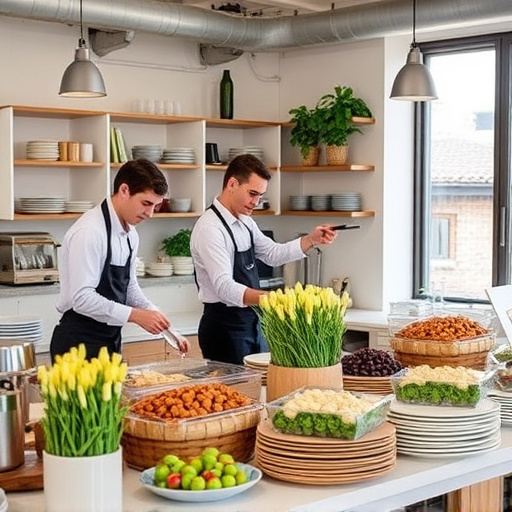Mastering Event Food Delivery: Strategies for Outdoor and Indoor Success
Event food delivery is crucial for successful gatherings, both indoor and outdoor, requiring meticul…….
In the dynamic world of events, catering plays a pivotal role in creating memorable experiences. Among various service sectors, event food delivery has emerged as a specialized and vital component, ensuring guests are not just fed but indulged with tailored culinary delights. This article delves into the intricate world of event food delivery, exploring its evolution, global impact, economic significance, technological innovations, regulatory framework, challenges, and future prospects. By examining these aspects, we aim to provide a comprehensive understanding of this dynamic industry and its role in shaping special occasions worldwide.
Definition: Event food delivery refers to the practice of preparing and transporting ready-to-serve food directly to event venues, catering to various gatherings such as weddings, corporate functions, festivals, and parties. It involves a meticulous process that starts from menu planning, sourcing ingredients, food preparation, packaging, and timely delivery to ensure quality and freshness.
Core Components:
Menu Customization: Caterers work closely with event organizers to create menus tailored to the client’s preferences, dietary restrictions, budget, and cultural significance.
Sourcing and Preparation: High-quality ingredients are sourced from local suppliers or imported specialties for dishes that align with the event theme or culinary traditions. Food is prepared in licensed kitchens, adhering to health and safety standards.
Packaging and Presentation: Food is artfully presented, often with customizable themes and styles, ensuring it remains fresh during transit. Eco-friendly packaging options are gaining popularity.
Delivery and Set-up: Timely delivery ensures food arrives at the event venue ready to be served. Caterers may offer on-site set-up services, including arranging serving stations and disposable or reusable tableware.
Historical Context:
The concept of event catering has deep roots in history, with ancient civilizations hosting grand feasts and banquets for various celebrations. However, the modern event food delivery industry gained traction in the 20th century as large-scale events demanded efficient and scalable catering solutions. The rise of mobile catering services and specialized food trucks further accelerated this trend. With advancements in logistics and food safety regulations, event food delivery has evolved into a sophisticated global industry.
Significance:
Event food delivery plays a crucial role in:
Enhancing Event Experiences: Delicious and well-presented food contributes significantly to the overall success of an event, creating memorable moments for guests.
Convenience and Efficiency: It simplifies the planning process by allowing organizers to focus on other aspects while ensuring a reliable culinary experience.
Cost Savings: By streamlining operations and leveraging economies of scale, caterers can offer competitive pricing without compromising quality.
Diverse Menu Options: Caterers can accommodate various dietary needs, cultural preferences, and culinary trends, catering to diverse audiences.
Event food delivery is a global phenomenon, with unique variations across regions. Here’s an overview of its international influence:
| Region | Unique Aspects & Trends |
|---|---|
| North America | Known for innovative cuisine, personalizing menus, and using local, seasonal ingredients. Pop-up catering and sustainable practices are gaining traction. |
| Europe | Emphasis on traditional, regional dishes with a modern twist. Organic and ethically sourced ingredients are popular, especially in urban centers like Paris and Berlin. |
| Asia Pacific | Rich diversity of culinary traditions, from Japan’s kaiseki to India’s vegetarian spreads. Event caterers often incorporate cultural elements into their menus. |
| Middle East & Africa | Influenced by diverse cultures, offering a fusion of Mediterranean, Asian, and local flavors. Large-scale events in the region demand extensive logistics planning. |
| Latin America | Vibrant and flavorful cuisine with a focus on fresh ingredients. Street food-inspired catering is popular for outdoor events. |
These regional variations contribute to a dynamic global market, where caterers continuously innovate to meet diverse tastes and cultural preferences.
The event food delivery industry contributes significantly to global economies:
Market Size: According to a 2022 report by Grand View Research, the global catering services market size was valued at USD 349.7 billion in 2021 and is projected to grow at a CAGR of 7.6% from 2022 to 2030. Event food delivery constitutes a substantial segment within this market.
Investment Patterns: The industry attracts significant investments, with many caterers offering franchising opportunities and expanding globally. High-end catering services target luxury events, while affordable options cater to mass markets.
Economic Impact: Caterers generate employment opportunities, support local businesses through ingredient sourcing, and contribute to hospitality tourism. During peak event seasons, they stimulate local economies and promote economic growth.
Technology has revolutionized event food delivery, improving efficiency and customer experiences:
Digital Menus and Customization: Online menu builders allow caterers to offer personalized options, ensuring guests can make choices that suit their tastes and dietary needs.
Real-time Tracking: GPS tracking and mobile apps enable clients to monitor the status of their food deliveries, providing transparency and peace of mind.
Online Ordering and Payment: Event organizers can streamline the process by allowing guests to place orders and make payments through dedicated event apps or websites, reducing administrative burdens.
Sustainable Solutions: Eco-friendly packaging, compostable utensils, and energy-efficient delivery vehicles are being adopted to minimize environmental impact.
AI and Predictive Analytics: Caterers use AI for inventory management, predicting demand based on historical data and event details, thus reducing food waste.
The event food delivery industry operates within a framework of laws and regulations that vary across jurisdictions:
Food Safety Standards: All caterers must adhere to strict food safety guidelines, including proper handling, storage, and preparation techniques to prevent foodborne illnesses.
Licensing and Permits: Businesses require licenses and permits for operating food services, often obtained through local health departments or event licensing authorities.
Taxation and Business Regulations: Caterers must comply with tax laws and other business regulations, including employee regulations and insurance requirements.
Environmental Policies: Many regions have guidelines for waste management, packaging disposal, and sustainable practices to minimize the industry’s environmental footprint.
Despite its growth, event food delivery faces several challenges:
Logistical Complexities: Delivering perishable goods on time while managing multiple events simultaneously requires meticulous planning and coordination. Bad weather, traffic congestion, or unforeseen delays can disrupt deliveries.
Dietary Diversity: Accommodating diverse dietary needs, such as gluten-free, vegan, or halal options, poses challenges in menu planning and sourcing ingredients that meet these requirements.
Waste Management: Food waste is a significant concern, with caterers striving to minimize surplus and adopt sustainable practices for disposal.
Competition and Pricing: In competitive markets, catering companies face pressure to maintain profit margins while offering competitive pricing, which can impact the quality of ingredients or service.
Actionable Solutions:
Advanced Planning and Technology: Implementing sophisticated event planning software and leveraging technology for real-time tracking and communication can enhance efficiency and reduce delays.
Collaborative Sourcing: Caterers can partner with local farmers and producers to source fresh, seasonal ingredients, supporting sustainable practices and ensuring quality.
Specialized Training: Investing in training programs for staff to handle diverse dietary needs and food safety protocols can improve service quality.
Waste Reduction Strategies: Adopting innovative waste management systems, such as compostable packaging and food recycling programs, can minimize environmental impact.
A renowned event catering company was hired to deliver a gourmet meal for a lavish wedding in Chicago’s Millennium Park. With over 500 guests, the challenge was to create a personalized menu that catered to diverse tastes while ensuring timely delivery across the city’s bustling streets. The caterer utilized digital menu customization tools, allowing the couple and their guests to select preferences from an extensive array of options. Real-time GPS tracking assured the bride and groom of their food’s safe arrival. This event showcased the company’s ability to handle large-scale logistics while delivering high-quality, personalized cuisine.
During the annual Gion Matsuri festival in Kyoto, a local catering service was tasked with feeding thousands of visitors over several days. The challenge lay in presenting traditional Japanese cuisine in an efficient yet authentic manner. The caterer partnered with local artisans to create custom biodegradable bowls and chopsticks for the event. They offered a variety of vegetarian options inspired by Kyoto’s culinary heritage, ensuring cultural sensitivity. This case highlights the importance of embracing local traditions while implementing sustainable practices in event food delivery.
A tech company organized an off-site retreat in a remote mountain location for employees and partners. The catering team had to ensure a healthy, sustainable menu that aligned with the event’s eco-friendly theme. They sourced locally grown produce from nearby farms and created a plant-based menu with options for various dietary restrictions. Compostable packaging and energy-efficient delivery vehicles were utilized, minimizing the event’s environmental impact. This case study demonstrates how event food delivery can contribute to corporate social responsibility initiatives.
The event food delivery industry is poised for continued growth and innovation:
Sustainability Focus: Eco-friendly practices will gain prominence, driven by consumer demand and regulatory pressures. Caterers will explore sustainable sourcing, packaging, and waste management solutions.
Personalization and Customization: Digital tools will enable even greater personalization, allowing guests to co-create their culinary experiences. Menus will offer a wide range of options tailored to individual preferences.
Fusion Cuisine: The fusion of global flavors will continue to evolve, offering event attendees unique and exciting culinary adventures. Caterers will experiment with innovative combinations, blending cultural traditions.
Experience-Based Catering: Event food delivery will move beyond mere sustenance, focusing on creating immersive dining experiences that align with the event theme. Interactive food stations, themed presentations, and storytelling through cuisine will become popular.
Technology Integration: AI, blockchain, and IoT (Internet of Things) technologies will revolutionize inventory management, supply chain logistics, and guest interactions, enhancing efficiency and customer satisfaction.
Event food delivery is a dynamic and ever-evolving industry that plays a crucial role in shaping memorable events worldwide. From its historical roots to the technological advancements of today, caterers have embraced innovation while remaining true to their core mission: providing exceptional culinary experiences. As the industry navigates challenges and embraces emerging trends, it will continue to contribute significantly to global economies, cultural celebrations, and corporate gatherings.
Q: How do I choose a reliable event food delivery service?
A: Research is key. Check online reviews, request quotes from multiple caterers, and inquire about their experience with similar events. Ensure they have the necessary licenses and insurance. Verify their ability to accommodate special dietary requests and their commitment to food safety and sustainability.
Q: Can event food delivery cater to large-scale events?
A: Absolutely! Caterers specializing in event food delivery are equipped to handle large crowds. They use advanced planning tools, efficient logistics, and sometimes even mobile kitchens to ensure timely service at scale.
Q: How can I reduce food waste at my event?
A: Work closely with your caterer to implement waste reduction strategies. Encourage guests to take only what they’ll eat, and consider using compostable packaging or recycling programs for disposable items. Leftovers can be donated to local food banks or community organizations.
Q: What are some unique ways to present food at my event?
A: Caterers offer creative presentation styles, from interactive food stations with live cooking demonstrations to themed displays inspired by the event’s theme. Customized menus and edible decorations can also add a unique touch to your event.
Q: How do I ensure my guests’ dietary needs are met?
A: Communicate clearly with your caterer about any special dietary requirements. They should be able to accommodate various needs, from gluten-free and vegan options to halal or kosher meals. Digital menu customization tools can make this process easier for both organizers and guests.

Event food delivery is crucial for successful gatherings, both indoor and outdoor, requiring meticul…….

In the competitive event catering industry, delivering fresh and flavorful food is key to success. T…….